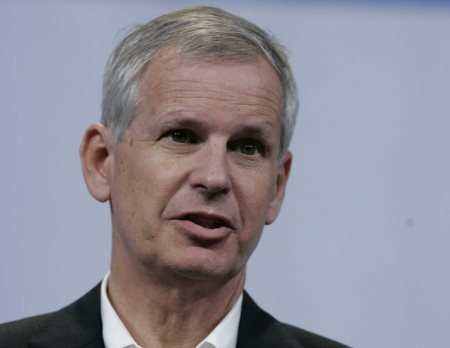Ergen Dishes to Analysts on Spectrum, Short-Sellers
The smarter way to stay on top of the multichannel video marketplace. Sign up below.
You are now subscribed
Your newsletter sign-up was successful

Dish Network chairman and CEO Charlie Ergen briefed about 80 analysts at a meeting in the Denver suburbs June 2, addressing some of the more pressing issues that have weighed on the company in recent months and offering hope that the time may be nigh for Dish to finally monetize its highly valuable wireless spectrum.
According to analysts that attended the meeting in a hotel near Dish’s Englewood, Colo., headquarters, Ergen didn’t offer any new information, but his reassurance that Dish is on pace to meet its spectrum buildout requirements, reinvigorated a bullish outlook for the company.
“The time to revisit this name is RIGHT NOW,” Wells Fargo media analyst Marci Ryvicker, who attended the meeting, shouted in a note to clients June 3. Ryvicker added that “transformational talks” among wireless players could begin after the current Federal Communications Commission 600 MHz broadcast spectrum auctions are completed. In her note, she said the “path to monetization will begin in [2018] AT THE LATEST.”
That is the period when Dish can finally begin unencumbered talks with potential partners/lessors for its spectrum, to either build the network out with a partner, lease the licenses to a third party or sell them outright.
According to Ryvicker and other analysts, because of federal regulations around the auction process to prevent collusion among wireless bidders, Dish was unable to hold substantive talks with any major provider that participated in spectrum auctions. The government has held auctions for AWS-3 and AWS-4 wireless spectrum and currently is taking bids for 600 MHz of broadcast spectrum. The timing of the 600 MHz auction is a bit hazy, but regulators expect it to last at least several months. FCC chairman Tom Wheeler has signaled to Congress the auction could drag past October.
“…For the first time in three years, given restrictions around the AWS-3 auction, they will be able to talk to potential partners / lessors,” said Pivotal Research Group CEO and senior media & communications analyst Jeff Wlodarczak.
Dish investors were equally optimistic, driving the stock up 5.5% ($2.95 per share) on June 2 to $53.68 each. The stock is up about 22% since May 5.Dish shares fell slightly in afternoon trading June 3 to $53.60 each, down 8 cents each or 0.15% per share.
The smarter way to stay on top of the multichannel video marketplace. Sign up below.
Dish’s 80 MHz of wireless spectrum has been the main reason to own the stock over the past few years, with some analysts valuing the spectrum at as much as $20 billion.
According to federal regulations, Dish has until 2020 to build out the spectrum or risk losing it. At the analyst meeting, Ergen reassured analysts that the company will meet that deadline.
In her note, Ryvicker wrote that Ergen “finally put the timing issue to bed,” telling the crowd that when other carriers begin building out their AWS-3 spectrum in 2017 and 2018, Dish will be next to them.
“Charlie could not have been clearer– he has never missed an FCC deadline and doesn’t intend to do so now,” Ryvicker wrote. She added that recent moves to incorporate its licenses in two bands – Band 66 and Band 70 – allows for the Dish spectrum to be placed in chip sets, which makes it a more attractive build-out partner.
Ergen also addressed issues brought up about a month ago by hedge fund Kerrisdale Capital Management, which has raised $100 million in a special fund for the sole purpose of shorting Dish shares. Kerrisdale estimated then that Dish stock was worth about $20 per share, or about half its price at the time.
Kerrisdale raised eight points to short Dish, and at the June 2 meeting, Ergen answered all of them, according to Ryvicker.
Ergen also quashed the idea that other carriers aren’t interested in its spectrum.
“We wish people would stop calling…..It isn’t just T [AT&T] and VZ [Verizon],” he said at the meeting, according to Ryvicker’s report, adding that foreign carriers, new media and cable operators were among the interested.
Despite the analyst optimism, Kerrisdale chief investment officer Sahm Adrangi said he still holds to the thesis that Dish is overvalued.
“The stock price movement isn’t indicative of how things will play out,” Adrangi said in an interview. “There haven’t been any actual events. Our argument is ultimately that $20 billion of value will not be realized.”
